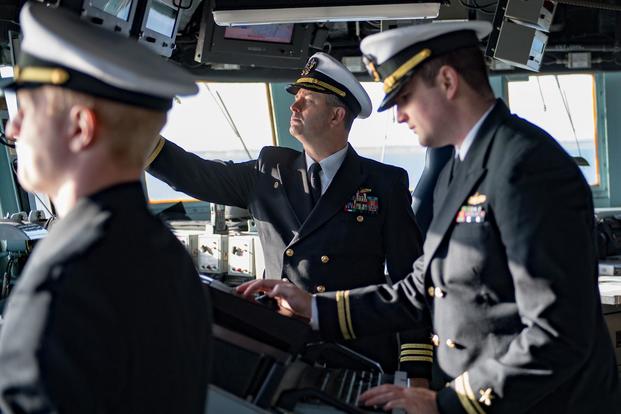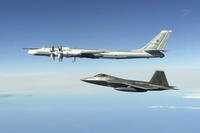With the resurgence of Russia and China in the maritime environment and a renewed era of what Naval Surface Forces commander Vice Adm. Richard Brown calls "Great Power competition," the Navy must embrace "mission command," the idea that subordinate commanders have freedom to make decisions, act and adapt as long as their actions support the commander's intent.
Speaking at the Surface Navy Association National Symposium on Tuesday in Arlington, Virginia, Brown said the service spent most of 2018 raising standards, meeting qualifications and improving training -- a response to deadly accidents in 2017 that killed 17 sailors.
But now, the Navy must concentrate on becoming a more lethal force. To get there, he told a room full of surface warfare officers and sailors, the service must require excellence from its commanders, including encouraging them to "boldly embrace and manage risk."
"I implicitly trust each of our commanding officers but, with that trust, comes incredible and unyielding responsibility and accountability. We must continue the hard work of relearning how to train, operate and fight in a 'mission command' environment," Brown said.
The term "mission command" dates to the late 19th century, a Prussian concept that decentralized decision-making can be highly effective in environments where a well-trained and equipped force and trust between commanders allows for independent thinking in support of the overall mission.
The U.S. Army has, since 2012, attempted to instill the principles of mission command through its forces and doctrine. But six years later, young leaders in the Army, from noncommissioned officers to lieutenant colonels, have been hesitant to embrace the concept, according to Gen. Stephen Townsend, head of Army Training and Doctrine Command.
"There is a lot of agreement that mission command is the right leadership and command doctrine for our Army; however, there is an alarming number of folks in uniform who don't believe that we, as an Army, are constantly practicing the principles of mission command," Townsend said during a Jan. 8 event at the Association of the United States Army.
Among the hurdles to creating a mission command climate is a historical precedence of a "zero tolerance" mentality for mistakes within the military services, and consequently, risk aversion by young leaders who fear for their jobs if they make a mistake.
To create an environment that embraces mission command, Brown said the Navy must support its people with combat-ready warships; "tough, battle-minded crews;" and bold commanders hungry for the challenge.
"Mission command requires innovation and creativity, experimentation and rapid learning," he said.
Noting that Russia and China are building their naval forces to challenge the U.S. -- a new "Great Power competition" -- while it still must deal with terrorists and rogue nations such as North Korea and Iran, Brown said the U.S. military must "work harder now and continue to get better."
He promised to enable young leaders and sailors by providing platforms that are ready to fight, lethal and capable. While 2018 was a year of building readiness, he said 2019 will be a year for the "unrelenting pursuit of excellence over compliance."
Brown added that officers would be prepared for the task by extending their division officer assignments to 48 months and leaving them in command for longer periods.
"Compliance stresses processes. Excellence stresses outcomes. ... Compliance produces only survivors. Excellence always produces winners," he said.
-- Patricia Kime can be reached at patricia.kime@military.com. Follow her on Twitter @patriciakime.












